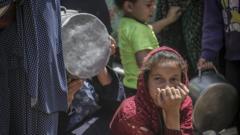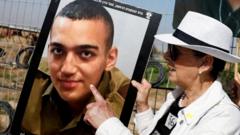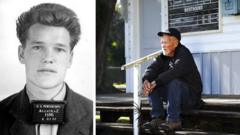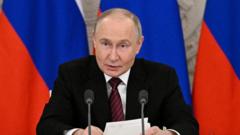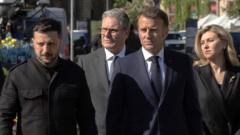French President Emmanuel Macron, along with other prominent political figures, attended a national soccer game against Israel, overshadowed by the violence surrounding a previous match in Amsterdam. Authorities ramped up security measures, deploying thousands of officers to prevent any unrest while ensuring the safety of attendees.
French Leaders Overshadow Soccer Match with Heavy Security Amid Violence

French Leaders Overshadow Soccer Match with Heavy Security Amid Violence
Soccer match between France and Israel takes center stage due to political tensions and heightened security after recent violence in Amsterdam.
In a match that would typically generate little excitement, heavyweights of French politics descended upon the Stade de France to witness the national team face off against Israel. With star player Kylian Mbappé absent and the stands notably sparse, the attention was less on sport and more on the political implications brought forth by the recent unrest in Amsterdam.
Following a violent encounter a week earlier involving an Israeli team in Amsterdam, where dutch authorities launched investigations into antisemitic attacks and disturbances, French leaders made it clear that they would not permit a repeat of such incidents. In response, the security measures surrounding the match were sophisticated and extensive, reminiscent of high-profile international events.
A reported 4,000 police officers were mobilized for the match day, with the majority concentrated around the stadium, while additional security personnel were tasked to maintain order in Paris and the transit system. The stringent protocols included multiple thorough security checks for all entering the premises, ensuring that the political narrative would not detract from the sporting event.
With their presence, French leaders have underscored not only the importance of unity in times of unrest but also the influence of politics over sports, a dynamic increasingly evident in global sporting events today.
Following a violent encounter a week earlier involving an Israeli team in Amsterdam, where dutch authorities launched investigations into antisemitic attacks and disturbances, French leaders made it clear that they would not permit a repeat of such incidents. In response, the security measures surrounding the match were sophisticated and extensive, reminiscent of high-profile international events.
A reported 4,000 police officers were mobilized for the match day, with the majority concentrated around the stadium, while additional security personnel were tasked to maintain order in Paris and the transit system. The stringent protocols included multiple thorough security checks for all entering the premises, ensuring that the political narrative would not detract from the sporting event.
With their presence, French leaders have underscored not only the importance of unity in times of unrest but also the influence of politics over sports, a dynamic increasingly evident in global sporting events today.

